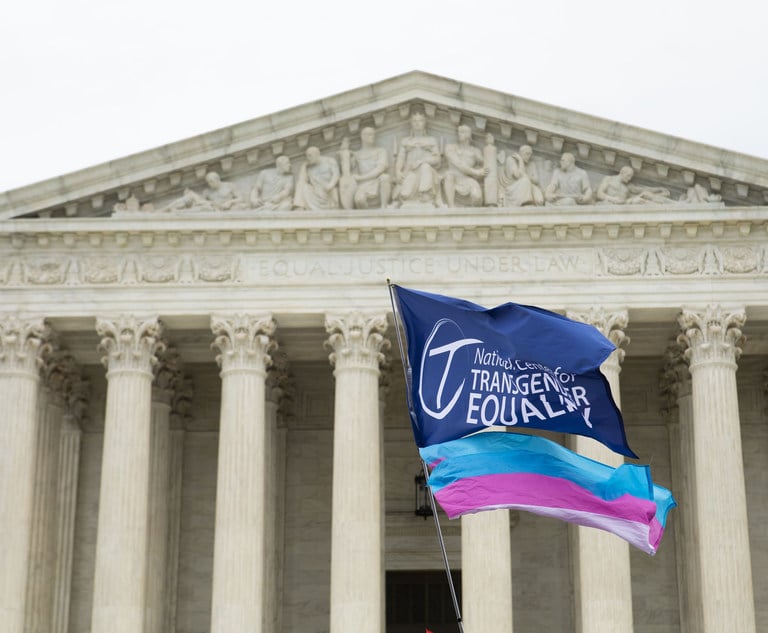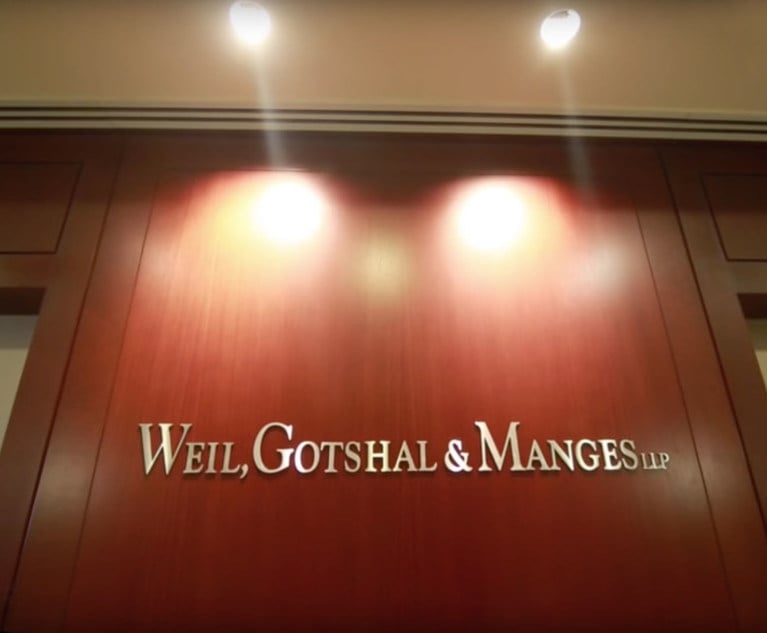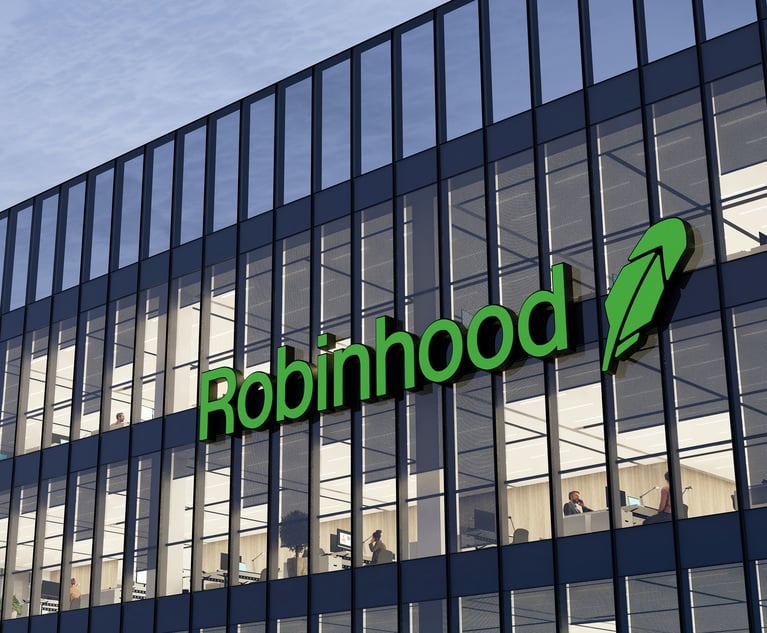 Lyft car. Jason Doiy/ALM.
Lyft car. Jason Doiy/ALM.2 New Suits Challenge Gig Worker Classification, And This Is Just the Beginning
The predicted spike in worker classification litigation—following the California Supreme Court's big gig economy ruling—is beginning. Two new suits challenge how Lyft and Postmates classify their workforce.
May 10, 2018 at 01:07 PM
5 minute read
Prominent on-demand companies Lyft Inc. and Postmates Inc. are unlawfully classifying their workers as independent contractors, according to new lawsuits that mark the beginning of an anticipated flood of cases tethered to a California Supreme Court ruling that upended employee classification schemes.
Shannon Liss-Riordan, a Boston-based lawyer who has long challenged how gig economy companies classify their workforces, filed two separate lawsuits this week on behalf of workers for Postmates, an on-demand delivery service, and the ride-hailing company Lyft.
The lawsuits come just days after the California Supreme Court ruling in Dynamex Operations West v. Superior Court set a more rigid standard for how a company can deem a worker as an independent contractor. The court reversed a more flexible standard, preferred by the business community, that gave companies more room for interpretation. Employment attorneys have said the new standard could make it difficult for gig economy companies to argue their workers are contractors and not employees.
➤➤ Get employment law news and commentary straight to your inbox with Labor of Law, a weekly email briefing from Law.com. Learn more.
The distinction between independent contractor and employee is a key tension in the growing gig economy and has been the source of high-profile trials, settlements and ongoing lawsuits. Many on-demand companies build their workforces around independent contractors, who are not entitled to the same benefits as employees.
The lawsuits filed in California Superior Court on May 8 argue on behalf of workers for minimum wage requirements and work expenses. The complaints both cite the “ABC” classification test adopted by the California Supreme Court ruling, and they argue the two companies are willfully ignoring that decision.
 Shannon Liss-Riordan. Credit: Jason Doiy / Recorder
Shannon Liss-Riordan. Credit: Jason Doiy / Recorder“It is going to be very difficult for these companies to justify independent contractor status for their drivers,” Liss-Riordan told the Recorder on Thursday. “After Dynamex, we believe that the companies' continued classification of the workers as independent contractors in California is a willful violation of the law.”
Lyft and Postmates representatives did not immediately respond to requests for comment.
Because many new gig economy workers sign arbitration agreements that preclude class actions, Liss-Riordan said the cases may have to be pursued on an individual basis. The lawfulness of class action waivers in employment agreements is at the heart of a U.S. Supreme Court case this term.
“It remains to be seen, however, whether it will be possible to pursue these cases on a class basis, given the companies' arbitration clauses,” Liss-Riordan said. “We are waiting for the U.S. Supreme Court to answer that question.”
Lyft and Postmates are not alone in facing new issues after the Dynamex ruling. The ruling could impact a Grubhub Inc. worker classification dispute that's pending in the U.S. Court of Appeals for the Ninth Circuit.
Liss-Riordan, who represented a Grubhub employee at trial in California, recently asked the Ninth Circuit to return the worker classification dispute back to the district court. In February, a federal trial judge ruled Grubhub had properly classified a driver as an independent contractor and not an employee.
“Notably, the Dynamex decision makes clear that California's adoption of the ABC test is a reinterpretation of existing law, and thus the decision will apply retroactively, including to plaintiff in this case,” Liss-Riordan wrote in a court filing on May 4. She said the Dynamex decision “upends” how the trial court had resolved the dispute in favor of Grubhub.
Grubhub Inc.'s lawyers at Gibson, Dunn & Crutcher plan to file a response to the remand request by May 18, according to court filings in the Ninth Circuit.
Liss-Riordan has previously sued Lyft and Postmates. In the Lyft case, the parties reached a settlement in federal court for $27 million, which released claims only up until the date of settlement.
Management-side employment attorneys have said the Dynamex ruling would likely inspire new misclassification litigation. Among other things, according to the ruling, a contractor is someone who is performing work outside the company's main business. A ride-hailing company might argue, however, that it is not a transportation company but rather is a technology company.
The new cases against Postmates and Lyft come as Lichten & Liss-Riordan closes its San Francisco office two years after opening there. “I am still in California myself frequently and expect to continue to be there often,” Liss-Riordan told The Recorder last month.
Read more:
This content has been archived. It is available through our partners, LexisNexis® and Bloomberg Law.
To view this content, please continue to their sites.
Not a Lexis Subscriber?
Subscribe Now
Not a Bloomberg Law Subscriber?
Subscribe Now
NOT FOR REPRINT
© 2024 ALM Global, LLC, All Rights Reserved. Request academic re-use from www.copyright.com. All other uses, submit a request to [email protected]. For more information visit Asset & Logo Licensing.
You Might Like
View All
Court rejects request to sideline San Jose State volleyball player on grounds she’s transgender
4 minute read

Stock Trading App Robinhood Hit With Privacy Class Action 1 Month After Alleged Data Breach

Justices Seek Solicitor General's Views on Music Industry's Copyright Case Against ISP
Trending Stories
- 1From 'Confusing Labyrinth' to Speeding 'Rollercoaster': Uncertainty Reigns in Title IX as Litigators Await Second Trump Admin
- 2Critical Mass With Law.com’s Amanda Bronstad: Why Jurors in California Failed to Reach Verdict Over Zantac, Bankruptcy Judge Tables Sanctions Against Beasley Allen Attorney
- 3Jones Day Client Seeks Indemnification for $7.2M Privacy Settlement, Plus Defense Costs
- 4Elections Have Consequences: Some Thoughts on Labor and Employment Law Topics in 2025 and Beyond
- 5Law Firm Associates, Staffers Continue to Put a Premium On Workplace Flexibility, Study Finds
Who Got The Work
Michael G. Bongiorno, Andrew Scott Dulberg and Elizabeth E. Driscoll from Wilmer Cutler Pickering Hale and Dorr have stepped in to represent Symbotic Inc., an A.I.-enabled technology platform that focuses on increasing supply chain efficiency, and other defendants in a pending shareholder derivative lawsuit. The case, filed Oct. 2 in Massachusetts District Court by the Brown Law Firm on behalf of Stephen Austen, accuses certain officers and directors of misleading investors in regard to Symbotic's potential for margin growth by failing to disclose that the company was not equipped to timely deploy its systems or manage expenses through project delays. The case, assigned to U.S. District Judge Nathaniel M. Gorton, is 1:24-cv-12522, Austen v. Cohen et al.
Who Got The Work
Edmund Polubinski and Marie Killmond of Davis Polk & Wardwell have entered appearances for data platform software development company MongoDB and other defendants in a pending shareholder derivative lawsuit. The action, filed Oct. 7 in New York Southern District Court by the Brown Law Firm, accuses the company's directors and/or officers of falsely expressing confidence in the company’s restructuring of its sales incentive plan and downplaying the severity of decreases in its upfront commitments. The case is 1:24-cv-07594, Roy v. Ittycheria et al.
Who Got The Work
Amy O. Bruchs and Kurt F. Ellison of Michael Best & Friedrich have entered appearances for Epic Systems Corp. in a pending employment discrimination lawsuit. The suit was filed Sept. 7 in Wisconsin Western District Court by Levine Eisberner LLC and Siri & Glimstad on behalf of a project manager who claims that he was wrongfully terminated after applying for a religious exemption to the defendant's COVID-19 vaccine mandate. The case, assigned to U.S. Magistrate Judge Anita Marie Boor, is 3:24-cv-00630, Secker, Nathan v. Epic Systems Corporation.
Who Got The Work
David X. Sullivan, Thomas J. Finn and Gregory A. Hall from McCarter & English have entered appearances for Sunrun Installation Services in a pending civil rights lawsuit. The complaint was filed Sept. 4 in Connecticut District Court by attorney Robert M. Berke on behalf of former employee George Edward Steins, who was arrested and charged with employing an unregistered home improvement salesperson. The complaint alleges that had Sunrun informed the Connecticut Department of Consumer Protection that the plaintiff's employment had ended in 2017 and that he no longer held Sunrun's home improvement contractor license, he would not have been hit with charges, which were dismissed in May 2024. The case, assigned to U.S. District Judge Jeffrey A. Meyer, is 3:24-cv-01423, Steins v. Sunrun, Inc. et al.
Who Got The Work
Greenberg Traurig shareholder Joshua L. Raskin has entered an appearance for boohoo.com UK Ltd. in a pending patent infringement lawsuit. The suit, filed Sept. 3 in Texas Eastern District Court by Rozier Hardt McDonough on behalf of Alto Dynamics, asserts five patents related to an online shopping platform. The case, assigned to U.S. District Judge Rodney Gilstrap, is 2:24-cv-00719, Alto Dynamics, LLC v. boohoo.com UK Limited.
Featured Firms
Law Offices of Gary Martin Hays & Associates, P.C.
(470) 294-1674
Law Offices of Mark E. Salomone
(857) 444-6468
Smith & Hassler
(713) 739-1250






